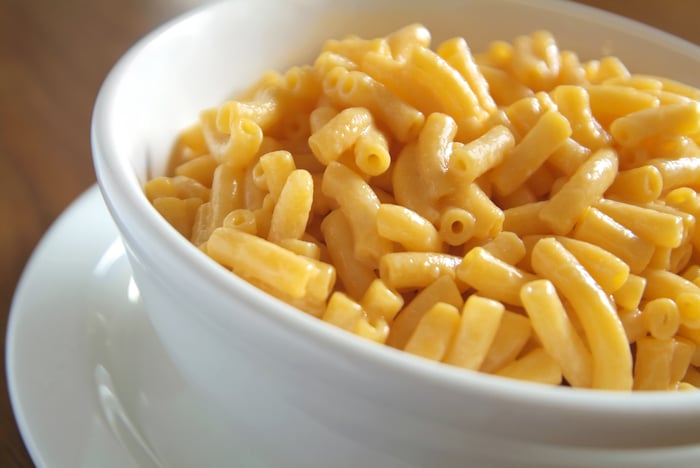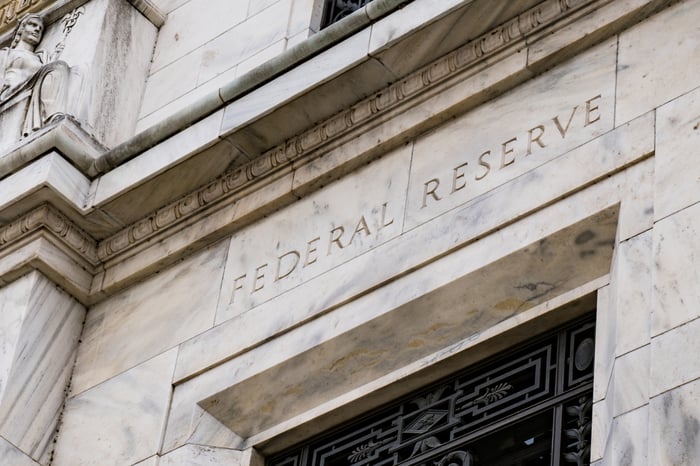You could say Berkshire Hathaway (BRK.A 0.36%) (BRK.B 0.21%) CEO Warren Buffett knows a thing or two about making money. Since taking the reins in 1965, Buffett has overseen the creation of more than $660 billion in value for shareholders (himself included), and guided his company to a 20.1% average annual return. Over 57 years, a 20.1% average return works out to an aggregate gain of more than 3,600,000% for the company's Class A shares (BRK.A).
While there is a laundry list of reasons behind Buffett's success, including his portfolio concentration and willingness to hold great companies for long periods, it's his love of dividend stocks that may be the true secret sauce. Over the next 12 months, Berkshire Hathaway is on pace to collect more than $6 billion in dividend income, including preferred stock dividends.

Berkshire Hathaway CEO, Warren Buffett. Image source: The Motley Fool.
Of the more than four dozen holdings in Berkshire Hathaway's portfolio, 10 are set to provide at least $100 million in passive income over the next year. You could rightly say these are Warren Buffett's 10 best dividend stocks (dividend payouts include holdings from New England Asset Management, which Berkshire owns).
1. Chevron: $904,131,705 in passive income over the next 12 months
The passive income kingpin in Buffett's portfolio is integrated oil and gas stock Chevron (CVX 0.08%). Berkshire acquired nearly 121 million shares of the energy giant during the first quarter.
Aside from its hearty 3.4% dividend yield, Buffett piling into Chevron likely signals his belief that crude oil and natural gas prices will remain elevated for the foreseeable future. Since energy companies weren't able to make big investments during the pandemic downturn, ramping up domestic output is going to be a slow process. That should favor Chevron's higher-margin upstream assets.
Then again, this is an integrated oil and gas giant, so it can always lean on the predictable cash flow from its midstream assets (pipelines and storage) or downstream refineries if commodity prices decline.

Image source: Getty Images.
2. Occidental Petroleum: $874,444,444 (includes preferred stock dividend)
Interestingly, Buffett's two best dividend stocks, based on payout, are oil stocks. Occidental Petroleum (OXY -1.26%) is expected to hand over more than $874 million to Berkshire Hathaway over the next year.
The bulk of this passive income stream -- $800 million annually -- derives from $10 billion in preferred stock that Berkshire owns. This $10 billion was given to Occidental to aid with its acquisition of Anadarko back in 2019.
Similar to Chevron, Occidental Petroleum looks well-positioned to capitalize on crude oil prices hitting multidecade highs. Between Russia invading Ukraine and oil companies paring back their capital expenditures over the past two years, getting supply back into the market will be a challenge. That's a recipe for high oil prices to persist.

Image source: Getty Images.
3. Bank of America: $867,595,685
Warren Buffett loves bank stocks, so it's no surprise to see Bank of America (BAC 1.59%) as one of his best dividend stocks. The more than 1 billion shares of BofA held should translate into almost $868 million in annual dividend income.
Buffett tends to like banks because they're cyclical. Even though recessions are inevitable, they don't last very long. By comparison, economic expansions often last years. Disproportionately long periods of expansion allow bank stocks like Bank of America to reap the rewards of making loans and taking in deposits.
Bank of America is also perfectly positioned to capitalize on rising interest rates. No big bank is more sensitive to interest rate movements. According to BofA, a 100-basis-point parallel shift in the interest rate yield curve should net it $5.4 billion in added net interest income over 12 months.

Image source: Apple.
4. Apple: $838,439,808
Tech behemoth Apple (AAPL -0.81%) is Berkshire Hathaway's largest holding and accounts for more than 38% of the company's invested assets. Based on an aggregate of roughly 911 million shares held, Buffett's company can expect $838.4 million in dividend income over the next year.
As I've previously pointed out, Apple checks all the right boxes for Buffett. It's an extremely well-known brand with an exceptionally loyal customer base that uses its innovation to drive sales and profits to record levels. It controls half of U.S. smartphone share, and Apple's CEO Tim Cook is overseeing a transition that'll focus on higher-margin subscription services.
Were this not enough, Apple has repurchased almost $499 billion of its own stock since 2013. Buffett has always been a big fan of Apple's capital return program.

Image source: Coca-Cola.
5. Coca-Cola: $704,000,000
Beverage stock Coca-Cola (KO 0.78%) is the Oracle of Omaha's longest-tenured holding. A fixture in Berkshire Hathaway's portfolio since 1988, Coke has increased its base annual payout for 60 consecutive years.
Coca-Cola's secret sauce continues to be its geographic diversity and marketing. With the exception of North Korea, Cuba, and Russia (the latter is due to the invasion of Ukraine), Coke has operations in every other country. This allows it to generate predictable cash flow in developed markets, as well as boost its organic growth rate in emerging markets.
Like Apple, Coca-Cola is also an extremely well-known brand. It's one of a handful of companies that can easily cross generational gaps to connect with users via holiday tie-ins, point-of-sale advertising, and social media campaigns.

Image source: Getty Images.
6. Kraft Heinz: $521,015,709
Even though it's been one of Warren Buffett's worst investments, packaged foods company Kraft Heinz (KHC 0.85%) is one of Berkshire's passive income superstars with a 4.1% yield.
Whereas most companies have been adversely impacted by the COVID-19 pandemic, Kraft Heinz received a boost. With more people choosing to eat at home, quick-prep meals and packaged foods have been popular supermarket buys. In fact, Wall Street's profit forecast for the company rose following the release of its first-quarter results.
On the other hand, Kraft Heinz's balance sheet remains unsightly. The company is lugging around a lot of debt, and there remains the possibility of additional goodwill writedowns. Without a lot of financial flexibility, reigniting excitement in Kraft Heinz's brands could be difficult.

Image source: American Express.
7. American Express: $315,350,256
If not for Coca-Cola, credit services company American Express (AXP -0.31%) would be Buffett's longest-held stock. A continuous holding since 1993, AmEx is on pace to generate more than $315 million in passive income for the Oracle of Omaha over the next 12 months.
Like most financial stocks, American Express is cyclical, which therefore allows it to benefit from long-winded expansions. AmEx is what I refer to as a "double dipper" in the sense that it charges fees to process payments as well as acts a lender to its cardholders. Collecting interest income/fees and merchants revenue is an easy way for the company to take advantage of bull markets.
What's more, AmEx has always had success attracting well-to-do clients. Individuals with higher incomes are less susceptible to economic downturns, and therefore less likely to alter their spending habits or fail to pay their bills.

Image source: U.S. Bank.
8. U.S. Bancorp: $265,045,247
Have I mentioned that Buffett loves bank stocks? Regional bank U.S. Bancorp (USB -3.61%), the parent of U.S. Bank, is another favorite that's set to bring in around $265 million in annual dividend income.
One the best aspects of U.S. Bancorp is its relatively conservative management team. Instead of chasing the riskier derivative investments that got money-center banks into trouble during the financial crisis, it's stuck to the bread and butter of banking: growing its loans and deposits. This is why it consistently has one of the highest returns of assets among the big U.S. banks.
U.S. Bancorp has also done an excellent job of promoting digital banking. Since the beginning of 2020, the percentage of loan sales completed online or via mobile app has risen from 45% to 65%. That's great news given that digital transactions are considerably cheaper for the company.

Image source: Getty Images.
9. Citigroup: $112,699,386
Yet another money-center bank that'll be piling on the passive income for Warren Buffett's company over the next year is Citigroup (C 2.02%). Berkshire purchased more than 55 million shares of Citi in the first quarter, which should translate into north of $112 million in annual dividend income.
Citigroup is arguably the least-liked big U.S. bank. The company's international exposure has hampered its operating performance in the past. To boot, Citigroup has been a magnet for U.S. regulators, which has resulted in some eye-popping settlements.
But Citi is also profitable and incredibly inexpensive. The company generated $5.3 billion in income from operations before income taxes during the first quarter and is valued at just 54% of its book value. Buffet loves a good value stock, and he might have one here with Citigroup.

Image source: Getty Images.
10. Bank of New York Mellon: $101,111,735
Finally, America's largest custodial bank, Bank of New York Mellon (BK 0.85%), rounds out Buffett's 10 best dividend stocks.
Perhaps the biggest catalyst for Bank of NY Mellon is the Federal Reserve's shift to hawkish monetary policy. Higher interest rates should allow the company to recognize a significant boost in net interest revenue. For context, first quarter net interest revenue rose 7% from the prior-year period, and the Fed has only recently shifted its policy stance. With multiple 50-basis-point rate hikes expected, BNY Mellon could see healthy top-and-bottom-line expansion.
This is also a company that's pretty consistently repurchased its common ($4.55 billion in buybacks completed in 2021). The Oracle of Omaha appreciates businesses that reward shareholders for their patience.





